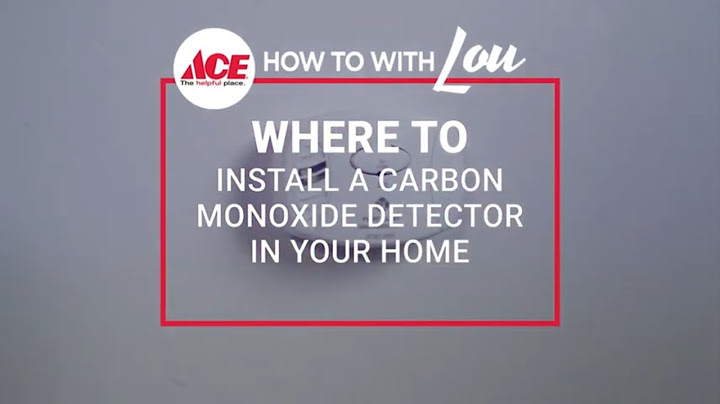Originally Published in Trailer Life Magazine Show
 Q:My wife and I live in our RV (we move around with our work) and have been for the last 10 months. Sometimes the carbon monoxide sensor/alarm goes off, apparently for no reason, usually in the middle of the night. I get up and check everything and turn off the propane tanks, bleed the lines and go back to bed, only to have it go off again. My opinion is that since the RV is closed at the time, with no windows or roof vents open and neither the heater nor air conditioner is on, (it happens when the temperature doesn’t require either of the units to be on), it must be that the carbon monoxide accumulation from our combined breath reaches the level of concentration to activate the alarm. This is the only explanation I can reason. Please give me your thoughts about it. – Ted Harrod | Via email A: Carbon monoxide is an odorless gas that is a silent killer. It is the result of incomplete combustion from sources such as furnaces, stoves, water heaters, propane refrigerators, engine and generator exhausts, etc. Humans don’t emit carbon monoxide during respiration; they expel carbon dioxide. Therefore, it can’t be triggering the alarm. Never assume that a detector is faulty and ignore it. If all the sources you noted here were off and the propane was shut off, it could be a faulty sensor. The sensors have a limited lifespan and go bad after a while, and most have expiration dates. However, you might want to have a certified RV technician review your RV before placing all the blame on the sensor and replacing it with a new unit. Play it safe; find out what’s going on before using your rig. – Ken Freund  Subscribe to RV.com and RV MagazineSubscriptions starting at only $14.97 per year. Carbon monoxide detectors keep going off without explanation. Various factors are to blame. These reasons will be outlined for you today. Low battery power and the expiration of the detector’s lifespan are common causes of carbon monoxide detector failure. After a few seconds, he will sound the alarm if the battery on your carbon monoxide detector is low. Related: RV Propane Detector Keeps Going Off (What to Do) Let’s read the other reasons with an explanation.
What is Carbon Monoxide?Carbon monoxide is known as a silent killer (nearly 400 people die in the US every year). Because this gas has no smell, no color, and is odorless. While CO does not have an odor, it is often mixed with gases that you can smell, such as CO, which can be inhaled without realizing that they are gases. Can Carbon Monoxide Cause Serious Health Problems in Your RV?Because CO picks up oxygen faster than it can pick up carbon monoxide, it’s so dangerous. The body replaces the oxygen in our blood with carbon monoxide when we inhale carbon monoxide, and high amounts of carboxylic acid can result in poisoning. Because of this, potentially lethal levels of the gas can build up inside RVs and trailers and you may not know until you become ill that it has done so. CO present at large concentrations can overwhelm a person in seconds, leaving them unconscious and suffocating. When enclosed or badly ventilated spaces accumulate carbon monoxide, they can poison the people inside. These are some of the symptoms of CO poisoning:
Carbon monoxide doesn’t seem serious to you? Over 50,000 emergency room visits are attributed to CO poisoning every year in the United States. It may be that the carbon monoxide detector is faulty or that it is going off frequently. These detectors can be exceptionally sensitive and may trigger if you spray your home with too much bug spray. Similarly, old RV batteries that have been drained of their hydrogen can trigger an alarm. Therefore, these two harmless reasons can set off your detector. It will be triggered when a gas detector, such as a pet gas detector, is attached to your detector. If moisture or condensation forms on the detector, it may also trip. Take the warning seriously! Let’s check these reasons: Reason 1: Contains Carbon MonoxideIf you have real CO in your RV, the CO detectors should flash solid red or remain solid red while you should hear four beeps. In this case, assume your RV is filled with carbon monoxide and follow these steps:
There are several reasons why carbon monoxide will beep every 15 to 30 seconds. Reason 2: Malfunctioning AlarmThe light on a malfunctioning alarm alternates between red and green every 30 seconds while it beeps every 30 seconds. To fix this, you can do one of the following:
Reason 3: Dirt on the DetectorWhen the battery is not drained and the voltage is normal, it is recommended that the battery be replaced as soon as possible. Don’t put yourself or your family at risk by putting them in danger. Your safety must always come first. Contact customer support to get a refund if your warranty is still active. MTI Industries’ Safe-T-Alert 35-742-BL Dual LP/CO Alarm can replace your old carbon monoxide/propane detector. You may also have an erroneous alarm if your carbon monoxide detector is dirty. Designed to be maintenance-free, they still require these steps for them to function properly:
Reason 4: CO Detector Battery is LowThe CO detector in your RV typically chirps every 30 seconds when its battery is running low. By observing the number and frequency of chirps, it may be possible to discern whether the vibrations are associated with low batteries or end-of-life. It’s important to read the manufacturer’s specifications. Batteries that are running low on your alarm and it is within their warranty period should be replaced as soon as possible. Even if you do not have a working CO alarm for one night, you and your family could become at risk. Reason 5: End of Lifespan:It is possible that the CO detector in your RV is at the end of its lifespan if it is continually going off and making an infrequent “beep” sound every thirty seconds or so. Carbon monoxide warnings commonly use a loud and continuous “Beep” sound instead of a soft and low-frequency beeping sound. CO detectors typically last between five and seven years (although some last up to ten years). A warning signal that indicates that a CO alarm should be replaced is installed on all CO alarms manufactured after August 1, 2009. You waste your money by changing your carbon monoxide detector’s battery when the carbon monoxide detector is near the end of its lifespan. An alarm at the end of its life-cycle may display an “ERR” “EOL” or “END” display. Note: These are the common steps for how to replace an RV carbon monoxide detector. Your RV CO detector could be different. If you are using a combo of carbon monoxide and propane detectors, you must follow the installation instructions from the manufacturer. Note: You should install a CO detector on the ceiling or the wall if you are installing it in a new place and it should be a minimum of 4 inches above the floor. Don’t install it in the distance of 12 inches or 5 ft near your kitchen. You should install it outside of the camper bedroom for your safety. Check out our guide on where to mount a carbon monoxide detector in an RV for further details. FAQsHow do I stop my camper carbon monoxide from beeping? You can stop it by changing the batteries. Mostly carbon monoxide beeping indicates that the power is running low. You can check your detector lifespan. Lifespan is also the second issue of beeping. What gives off carbon monoxide in an RV? Anything that does not produce carbon monoxide will remain carbon monoxide detector off. Such as Water heater, refrigerator, Generator and much more. Final ThoughtsWe can see this beautiful world by traveling. If we save our life then we can see this world. Carbon monoxide is a silent killer. If your carbon monoxide keeps going off then you must check the lifespan and battery power. If both are good then call the expert technician and stay away from RV. Why does my carbon monoxide detector keep going off in my camper?If your RV carbon monoxide detector keeps going off and it is making an intermittent “Chirp” sound every 30 seconds or so – it may mean that your CO detector is at the end of its lifespan.
What would cause carbon monoxide in a camper?In campers and RVs, items that emit carbon monoxide include built-in or portable generators, gas-powered heaters, gas ranges or ovens, portable camp stoves and gas water heaters. The carbon monoxide emitted can build up in enclosed, semi-enclosed or poorly-ventilated spaces, poisoning people and animals who breathe it.
Can a carbon monoxide detector go off falsely?Smoke and carbon monoxide (CO) detectors can false alarm for several reasons. False or nuisance alarms are when your smoke detector or CO alarm goes off, but there is no presence of smoke or carbon monoxide in your home.
Can you get carbon monoxide poisoning from propane in a camper?Portable fuel-burning equipment including wood, charcoal, and propane grills and stoves should not be used inside the RV or near the entryway. The use of this equipment inside an RV can cause fires or carbon monoxide poisoning.
|

Related Posts
Advertising
LATEST NEWS
Advertising
Populer
Advertising
About

Copyright © 2024 nguoilontuoi Inc.


















